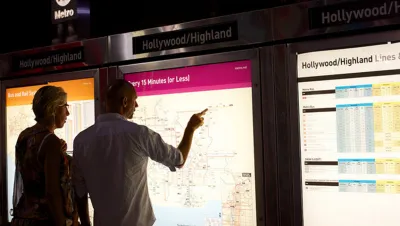If Los Angeles residents approve the $120 billion sales tax measure in November, focusing on walkable communities and offering fast, frequent transit service will be critical to its success.

"There is no place in the country better positioned to use transit to its advantage than Los Angeles County," opines Steven Higashide, a senior program analyst for TransitCenter, a New York foundation dedicated to improving urban mobility.
And should voters pass a county sales tax measure on November 8 by over two-thirds, $120 billion will be available to build-up public transit. But it's not just a matter of laying more track, constructing new stations, planning new bus lines and operating trains and running buses.
[I]f the goal of Los Angeles’ transit investments is to have buses and trains shape the region in the 21st century the way the automobile did in the 20th — building transit is not enough. For proof, look no further than Metro’s overall ridership, which so far is 5.5% lower in 2016 than in 2015 despite two new rail extensions.
Higashide repeats a theme made by Kevin Cashman, a Truthout researcher, in his recent critique of new transportation technologies, particularly in their ability to serve lower income populations.
For all the talk about using Uber, Lyft and bike share to bridge the 'first mile, last mile' gap to transit, it’s far more important to put bus and rail stops in places where people don’t have to walk a mile or more to reach them.
Transit needs to be in the middle of the action, not sent to the edge of town. New housing, offices, and retail should be concentrated near it.
Higashide points to a new TransitCenter report, "'Who’s On Board' [PDF], that gathered data from three focus groups and a survey of 3,000 people in 17 metro areas in the United States, [that] sheds light on how it can be done."
"It builds on the findings from TransitCenter’s first Who’s On Board report released in 2014 [and posted here] — the largest-ever attitudinal survey of transit riders—which showed that Americans from coast to coast think about and use public transit in remarkably similar and often unexpected ways," states the press release.
Higashide emphasizes the need to "reform land-use regulations to nurture inviting walking environments."
As another Times opinion piece noted, Los Angeles is a major global city whose zoning codes, parking requirements and development politics treat it like an enormous suburb. For transit to succeed, those laws and attitudes must change.
And the top priority for new transit expansion should be busy destinations that are already walkable. By making transit frequent and fast and building walkable neighborhoods around transit, Los Angeles can make it a practical choice for many more people.
FULL STORY: Opinion: Without more walkable cities, building new transit won't reverse Metro's ridership decline

Analysis: Cybertruck Fatality Rate Far Exceeds That of Ford Pinto
The Tesla Cybertruck was recalled seven times last year.

National Parks Layoffs Will Cause Communities to Lose Billions
Thousands of essential park workers were laid off this week, just before the busy spring break season.

Retro-silient?: America’s First “Eco-burb,” The Woodlands Turns 50
A master-planned community north of Houston offers lessons on green infrastructure and resilient design, but falls short of its founder’s lofty affordability and walkability goals.

Test News Post 1
This is a summary

Analysis: Cybertruck Fatality Rate Far Exceeds That of Ford Pinto
The Tesla Cybertruck was recalled seven times last year.

Test News Headline 46
Test for the image on the front page.
Urban Design for Planners 1: Software Tools
This six-course series explores essential urban design concepts using open source software and equips planners with the tools they need to participate fully in the urban design process.
Planning for Universal Design
Learn the tools for implementing Universal Design in planning regulations.
EMC Planning Group, Inc.
Planetizen
Planetizen
Mpact (formerly Rail~Volution)
Great Falls Development Authority, Inc.
HUDs Office of Policy Development and Research
NYU Wagner Graduate School of Public Service




























